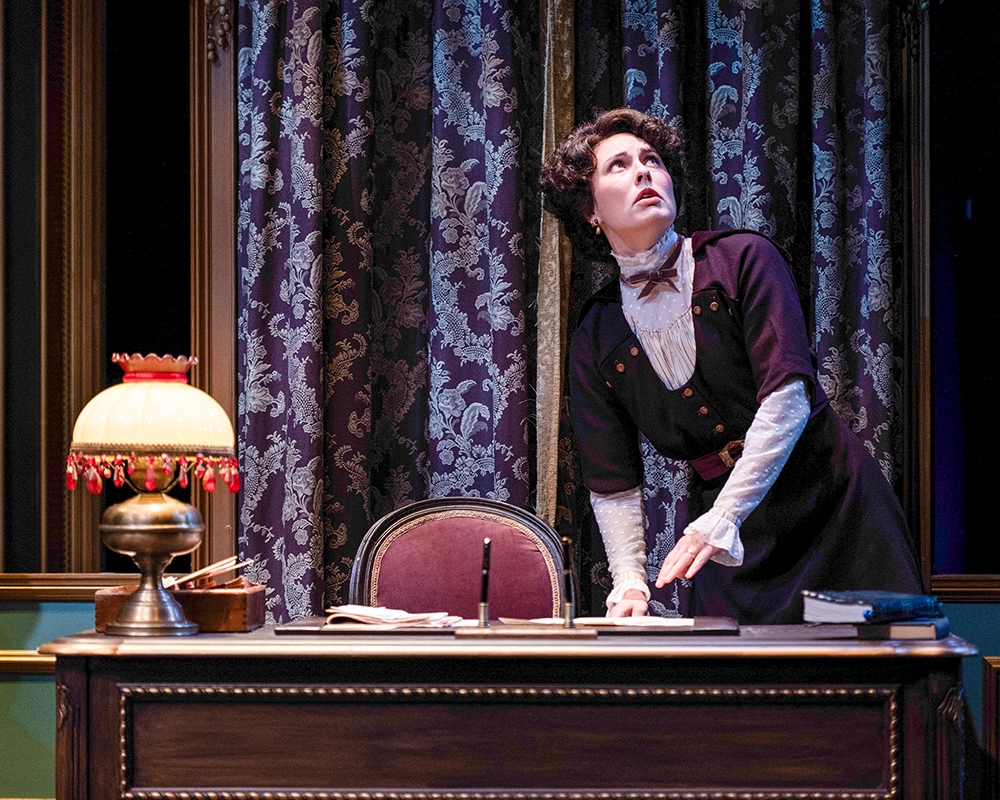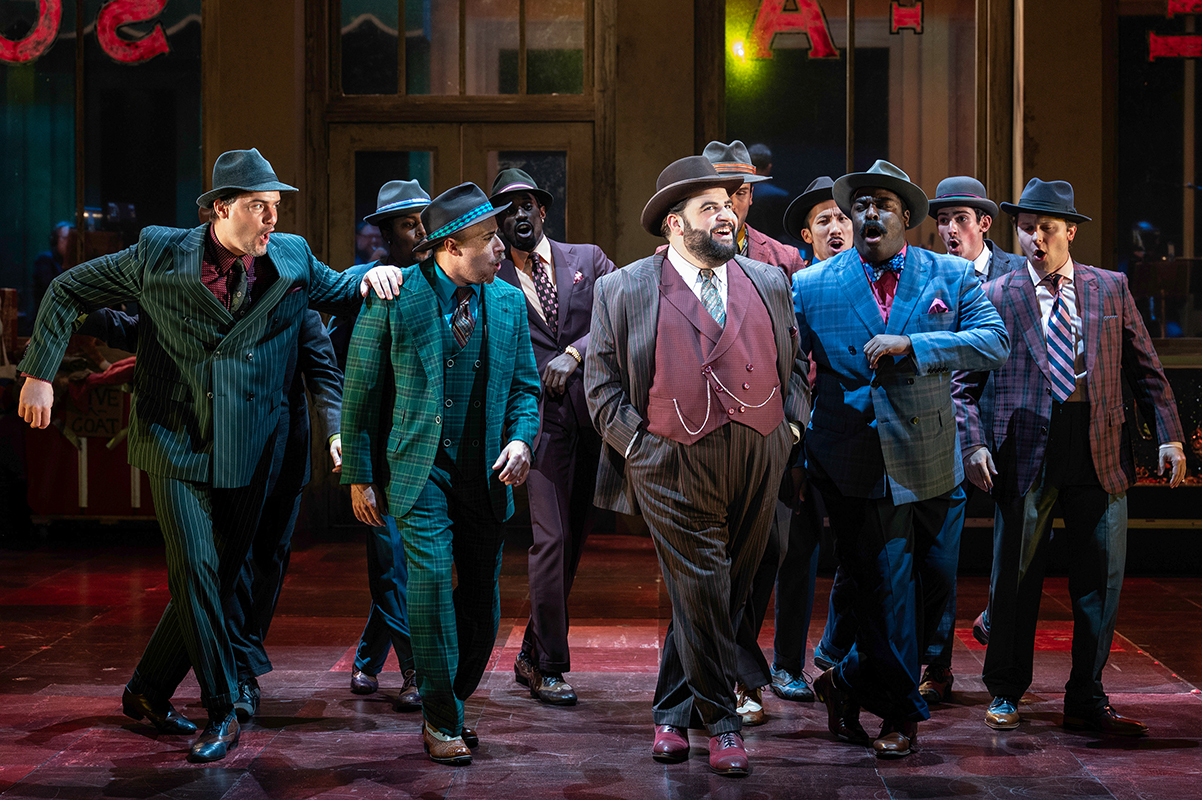‘Carmen’ Review: Lost Angels
Reimagining the classic tale as a modern cross-border romance, Benjamin Millepied's 'Carmen' dances to its own sensuous beat.
By André Hereford on May 7, 2023 @here4andre

The heroine of director-choreographer Benjamin Millepied’s Carmen (★★★☆☆) isn’t the wanton temptress of Bizet’s classic opera. Portrayed by Scream queen Melissa Barrera, this raven-haired Carmen might put a bullet in a man if she has to, but that’s because she’s a survivor, not a betrayer.
In fact, her journey in this dance- and music-driven drama begins with a warning from her late mother, voiced from the beyond, that men are not to be trusted.
All men, or just one man, madre says, it’s all the same: they yearn for the tears, milk, and blood of womanhood. Mother makes a rock-solid point, borne out by the succession of hungry, violent men hounding Carmen’s path from Mexico to Los Angeles.
Traveling on foot with a group of migrants trekking north to the U.S. border through the Chihuahuan Desert, Carmen fatefully runs into one violent man, though, whose heart, contrary to her mother’s warning, appears to pump blood, not sand.
Ex-Marine Aidan, embodied by Aftersun Oscar nominee Paul Mescal as still waters running deeper than we can know, is introduced working out his boxing moves on a heavy bag hung from a carport. He’s hungry, but held back by post-combat trauma he can’t express.
Hoping to jog his spirit, and his bank account, his sister Julieanne (Nicole da Silva) hooks Aidan up with the local civilian Border Patrol, whose trigger-happy leader incites the deadly gunfight that throws Aidan and Carmen together, on the run from her enemies, his enemies, and the law.

The first feature film from Millepied — former dance director of the Paris Opera Ballet, and choreographer of Black Swan — adapts Prosper Mérimée’s novella Carmen and its inspiration, The Gypsies, a narrative poem by Alexander Pushkin, into a rapturous visual ballet, blending dialogue, music by the brilliant Nicholas Britell (Moonlight), a few original songs, and dance.
Mescal, flattening his natural brogue into a flat, indiscernible American accent, sings and strums a sweetly sad ballad, laying Aidan’s open heart on the line.
Barrera, who, before she was dodging Ghostface, was high-kicking through the streets of Uptown Manhattan in In the Heights, serenades a fearful young migrant with a haunting melody, and later, performs a gorgeously-sung lament of impossible love.
The singing gives way to a luscious tango partnering Carmen with a handsome dancer from the enigmatic dive run by her godmother Masilda, played by the one and only Rossy de Palma, who delivers a typically impassioned, soulful turn.
The presence of Pedro Almodóvar’s illustrious muse signals, along with touches of magical realism, and the expressive costumes and choreography, the film’s bent towards artsy eccentricity, despite the ripped-from-the-headlines premise of a fatal standoff between migrants and a border patrol.

Millepied, with screenwriters Alexander Dinelaris and Loïc Barrère, has concocted a fable, not a screed or exposé, but a fairy-tale romance set in the iconic American West. Cinematographer Jörg Widmer shoots ribbons of highway laced through fields of golden grasses under bright blue skies with a foreigner’s fascination for the earthy palette and harsh terrain.
Carmen and Aidan hit the road in an ’88 Chevy pickup chased by muscle cars. In a different era, they’d be puffing clouds of Marlboros, too.
The pair generates plenty of heat in a sexy moonlit dance duet, and a brief love scene that unfolds like a tempestuous pas de deux. Barrera and Mescal’s obvious physical chemistry, however, can’t disguise that the film expends little effort, story-wise, shoring up their attraction beyond necessity in a hectic moment, and plain lust. They’re both two decent-seeming people, yet, ultimately, those still waters don’t run that deep.
But the view is gorgeous. Throughout, Widmer keeps the camera in smooth motion in sync with the action, be it acts of violence, or of rhythm and romance.
Millepied keeps the styles of music and choreography varied, taking us from Romani-inspired flamenco to a hip-hop-inflected boxing match dance number that plays like Stomp meets Fight Club. Dense with the atmosphere of desire, danger, and minor-key melancholy, it’s the world the film creates, more than the romance inside it, that seduces and wins the heart.
Carmen is playing in select theaters, including Landmark’s E Street Cinemas. Visit www.landmarktheatres.com or www.fandango.com.
More from Metro Weekly:
Deceived Review: A Gothic Gaslighting Thriller at Everyman
Everyman Theatre’s reworking of Gaslight centers female agency, delivering compelling atmosphere and intrigue.
By André Hereford on December 16, 2025 @here4andre
Is willowy Londoner Bella truly going mad, or is her enigmatic husband Jack carrying out a devious plot to convince her she's losing her mind? And if so, to what end? In modern terms, Bella is desperately pondering whether Jack is trying to gaslight her into thinking she's going insane.
The terminology and the plot of Johnna Wright and Patty Jamieson's Deceived, now at Everyman Theatre, derive from Patrick Hamilton's Victorian thriller Gas Light, which premiered in 1938, before being adapted into the Oscar-winning 1944 film Gaslight, starring Ingrid Bergman as distressed newlywed Paula.
Guys and Dolls at Shakespeare Theatre Company Is Showstopping
Francesca Zambello delivers lavish Golden Age spectacle, standout musical numbers, and big Broadway flair.
By Kate Wingfield on December 22, 2025
Putting aside the curious question of why the Shakespeare Theatre Company has taken to staging musical theater -- this season it's Guys and Dolls -- the happy news is that director Francesca Zambello doesn't need to keep her day job (although let's hope she does).
She may be the artistic director of the Washington National Opera, but she's clearly got the eye, ear, and vision for a whole different kind of crowd. This is no-holds-barred Golden Age rom-com song-and-dance magic brought fully to life with some serious spectacle. From scenic designer Walt Spangler's mind-blowing industrial shop space, with all its peeling paint and careworn shop décor, to a live orchestra conducted with complete and utter flair by James Lowe, it's something to behold.
Lovell Holder Turns Reality TV Into a Queer Reckoning
His novel, The Book of Luke, blends queer romance, politics, and competition at a moment when LGBTQ readers are craving big, messy stories.
By André Hereford on January 12, 2026 @here4andre
Lovell Holder's debut novel, The Book of Luke, arrives at a precipitous moment for queer literary fiction. The heated tale of a handsome gay ex-athlete romancing a rival (or two) on a hit reality TV competition, the book seems custom-built to reach the ravenous audience that's turned the Heated Rivalry books and TV series into a phenomenon.
Of course, Holder, who's also a filmmaker, started writing The Book of Luke several years ago, with a different intention than riding the wave of a gay hockey hit.
Holder started the book, which chronicles the life and reality TV adventures of Luke Griffin, the soon-to-be ex-husband of a gay Republican U.S. Senator, in 2019. "I was really interested, at that time, in the idea of complicity and how underrepresented communities can sometimes oppress members of other underrepresented communities," he says.
Support Metro Weekly’s Journalism
These are challenging times for news organizations. And yet it’s crucial we stay active and provide vital resources and information to both our local readers and the world. So won’t you please take a moment and consider supporting Metro Weekly with a membership? For as little as $5 a month, you can help ensure Metro Weekly magazine and MetroWeekly.com remain free, viable resources as we provide the best, most diverse, culturally-resonant LGBTQ coverage in both the D.C. region and around the world. Memberships come with exclusive perks and discounts, your own personal digital delivery of each week’s magazine (and an archive), access to our Member's Lounge when it launches this fall, and exclusive members-only items like Metro Weekly Membership Mugs and Tote Bags! Check out all our membership levels here and please join us today!
The Magazine
-
Most Popular
 Anti-Gay Tirade Caught on Video in Maryland Supermarket
Anti-Gay Tirade Caught on Video in Maryland Supermarket  Dead Man’s Wire: Bill Skarsgård on a Hair-Trigger Edge
Dead Man’s Wire: Bill Skarsgård on a Hair-Trigger Edge  Plastique and Nymphia Unleash the Kink
Plastique and Nymphia Unleash the Kink  Lovell Holder Turns Reality TV Into a Queer Reckoning
Lovell Holder Turns Reality TV Into a Queer Reckoning  Burglary Suspect Arrested After Molesting, Urinating on Victim
Burglary Suspect Arrested After Molesting, Urinating on Victim  Three LGBTQ Players On U.S. Women’s Olympic Hockey Team
Three LGBTQ Players On U.S. Women’s Olympic Hockey Team  DOJ Rolls Back LGBTQ Prison Rape Protections
DOJ Rolls Back LGBTQ Prison Rape Protections  Maryland Woman Jailed Over Transgender Graffiti ‘Hate Crime’
Maryland Woman Jailed Over Transgender Graffiti ‘Hate Crime’  Stranger Things Creators Address Coming-Out Backlash
Stranger Things Creators Address Coming-Out Backlash  Louisiana Man Charged With Extorting LSU Student Into Sex
Louisiana Man Charged With Extorting LSU Student Into Sex
 Anti-Gay Tirade Caught on Video in Maryland Supermarket
Anti-Gay Tirade Caught on Video in Maryland Supermarket  Plastique and Nymphia Unleash the Kink
Plastique and Nymphia Unleash the Kink  Lovell Holder Turns Reality TV Into a Queer Reckoning
Lovell Holder Turns Reality TV Into a Queer Reckoning  Dead Man’s Wire: Bill Skarsgård on a Hair-Trigger Edge
Dead Man’s Wire: Bill Skarsgård on a Hair-Trigger Edge  ICE Agent Fatally Shoots Queer Woman in Minneapolis
ICE Agent Fatally Shoots Queer Woman in Minneapolis  Heated Rivalry Outpaces NHL Stars in Online Searches
Heated Rivalry Outpaces NHL Stars in Online Searches  Trump Says Democrats Will Impeach Him if They Retake Congress
Trump Says Democrats Will Impeach Him if They Retake Congress  Salt Lake City Council Reaches Historic LGBTQ Majority
Salt Lake City Council Reaches Historic LGBTQ Majority  Stranger Things Creators Address Coming-Out Backlash
Stranger Things Creators Address Coming-Out Backlash  Three LGBTQ Players On U.S. Women’s Olympic Hockey Team
Three LGBTQ Players On U.S. Women’s Olympic Hockey Team
Scene
Metro Weekly
Washington's LGBTQ Magazine
P.O. Box 11559
Washington, DC 20008 (202) 527-9624
About Us pageFollow Us:
· Facebook
· Twitter
· Flipboard
· YouTube
· Instagram
· RSS News | RSS SceneArchives
Copyright ©2025 Jansi LLC.














You must be logged in to post a comment.